I want to introduce Priscilla by grouping together the scriptures that 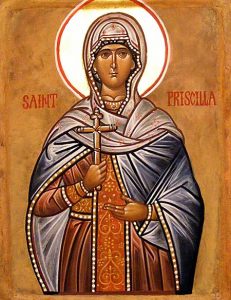 refer to her for easy reference. The bulk of information about her comes from Acts 18, but she is also mentioned in three other books. Note that Prisca (as she is referred to in 2 Timothy) was probably actually her name, Priscilla being a diminutive.
refer to her for easy reference. The bulk of information about her comes from Acts 18, but she is also mentioned in three other books. Note that Prisca (as she is referred to in 2 Timothy) was probably actually her name, Priscilla being a diminutive.
Romans 16:3-4
3 Greet Priscilla and Aquila my helpers in Christ Jesus:
4 Who have for my life laid down their own necks: unto whom not only I give thanks, but also all the churches of the Gentiles.
Acts 18: 1-3
1 After these things Paul departed from Athens, and came to Corinth;
2 And found a certain Jew named Aquila, born in Pontus, lately come from Italy, with his wife Priscilla; (because that Claudius had commanded all Jews to depart from Rome:) and came unto them.
3 And because he was of the same craft, he abode with them, and wrought: for by their occupation they were tentmakers.
Acts 18:18
And Paul after this tarried there yet a good while, and then took his leave of the brethren, and sailed thence into Syria, and with him Priscilla and Aquila; having shorn his head in Cenchrea: for he had a vow.
Acts 18:24-26
24 ¶And a certain Jew named Apollos, born at Alexandria, an eloquent man, and mighty in the scriptures, came to Ephesus.
25 This man was instructed in the way of the Lord; and being fervent in the spirit, he spake and taught diligently the things of the Lord, knowing only the baptism of John.
26 And he began to speak boldly in the synagogue: whom when Aquila and Priscilla had heard, they took him unto them, and expounded unto him the way of God more perfectly.
1 Corinthians 16:19
The churches of Asia salute you. Aquila and Priscilla salute you much in the Lord, with the church that is in their house.
2 Timothy 4: 19
19 Salute Prisca and Aquila, and the household of Onesiphorus.
As I studied Priscilla for this post, what struck me above all things was how Priscilla is an example of partnership. While the contemporary church has improved greatly in placing nominal emphasis on partnership between husbands and wives, within ward councils and within organizations, the lived reality often falls short. A careful reading of Priscilla yields a scriptural precedent for greater equality in leadership and labor.
Linguistic Partnership
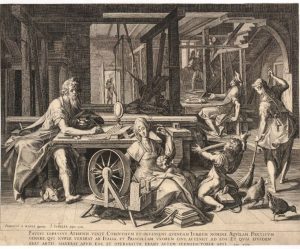 Priscilla and Aquila are always mentioned as a team, never separately. The order in which their names appear is also equally divided – half of the verses discuss Aquila and Priscilla, while the other half put Priscilla first. As we have often discussed on this blog, language matters. It matters in church that brothers always comes before sisters. It matters when a male pronoun is treated as if it were all-inclusive. I like Priscilla because she bucks that trend. She commanded enough respect to be mentioned first, yet the linguistic homage did not somehow diminish her husband or damage their relationship.
Priscilla and Aquila are always mentioned as a team, never separately. The order in which their names appear is also equally divided – half of the verses discuss Aquila and Priscilla, while the other half put Priscilla first. As we have often discussed on this blog, language matters. It matters in church that brothers always comes before sisters. It matters when a male pronoun is treated as if it were all-inclusive. I like Priscilla because she bucks that trend. She commanded enough respect to be mentioned first, yet the linguistic homage did not somehow diminish her husband or damage their relationship.
It seems wildly unlikely that early Christian authors were making a conscious effort at equality of emphasis in how they ordered the names. The fact that Priscilla was mentioned first multiple times suggests that she was very highly regarded in the Christian community as a leader. Changing the way we speak about members currently, giving equal emphasis to women, is not simply an exercise in pedantic nitpickery. If we claim to hold women in high esteem and value their contributions, then naturally we’ll find ourselves often mentioning them first. We as LDS people often say we value women, but our small linguistic tics undermine that message.
Working partnership
The Book of Acts tells us that Priscilla and Aquila were tentmakers by trade, and that Paul joined with them in that work. Priscilla was engaged in a skilled trade beyond whatever domestic duties she may have had. There is no suggestion that working alongside her husband was in some sense a less than ideal arrangement. We know little of their private life. Did they have children? What life stage were they in when they worked with Paul? It seems entirely possible that they did have children, and yet nowhere do any writers suggest that motherhood disqualified her from having a trade, or acting as a minister and teacher.
Additionally, Paul worked willingly with Priscilla and Aquila. They seemingly were not gripped by fear that a man working alongside a woman who was not his wife would inevitably lead to adultery, and Paul was in general very leery of fornication. If Paul could manage to make tents and preach the Gospel with a married woman, perhaps married women can do many things without entraping male leaders! Priscilla is a powerful precedent for women working outside the home, and also for men and women to work together in the church.
Stranger in a Strange Land
The few verses of scripture that we have about Priscilla show that she spent much of her adult life as an immigrant and a refugee. I will briefly sketch the chronology as I understand it:
- Aquila originally comes from Pontus, a region near the Black Sea. Priscilla may have also been from Pontus, or she may have been Roman.
- Priscilla and her husband convert to Christianity and are living in Rome. They are forcibly expelled by Emperor Claudius.
- From Rome they go to Corinth in Greece, where they meet Paul.
- They travel with Paul to Syria.
- They end up at Ephesus in present day Turkey, where Paul leaves them
- Paul sends them greetings in Rome, so clearly they returned there some time after having met Paul.
Priscilla and Aquila were migrants. More specifically, they were constantly strangers in a strange land. The Bible is full of people on the move, but significantly they were often moving about within their own territory. The ancient Israelites were nomadic, and indeed Priscilla and Aquila’s trade underlines this – they were tentmakers. However, Prisca and Aquila were not nomads in the sense of moving about within their own homeland. Instead, they were immigrants, again and again until even if they returned home they would likely be seen as strangers.
In this respect Priscilla is particularly relevant to our time. In many parts of the world, the issue of immigration is extremely tense. Many Europeans are concerned about an influx of refugees, while in America politicians use immigrants as scapegoats for terrorism, poverty and crime.
Priscilla knew what it was to be hated for being strangers. They were cast out of Rome for having converted to Christianity. Yet Paul thanks God for Priscilla, and for the risks she ran to share the Gospel. To those who are currently immigrants themselves, she is a heroine and an example. To those who fear that immigrants may bring negative things to a society, it is worth remembering that immigrants like Priscilla, Aquila, and Paul also made the growth of Christianity possible because they were willing to face discrimination to share the Gospel. A partnership between native daughters of a land and refugees has the potential to bring strength and salvation.
A Woman of Courage
Priscilla was a woman who was confident in her spiritual knowledge. Paul refers to her as a “helper in Jesus Christ” who had put her own life on the line for what she knew: Paul praised her and her husband for having “for my life laid down their own necks.” This was no idle statement. Priscilla and Aquila had been cast out of Rome for their beliefs. In their day persecution for being a Christian was a real mortal danger, rather than a hypothetical talking point. Furthermore, they traveled extensively through the Mediterranean to share the Gospel with Paul, a dangerous proposition in itself.
Additionally Priscilla and Aquila expounded “the way of God more perfectly” to Apollos, who only partially understood the Christian message. Apollos spoke boldly in the synagogue according to his knowledge, which was limited but heartfelt. It takes both courage and delicacy to approach someone you scarcely know to tell them they’re not entirely correct. Priscilla evidently did this in such a way that Apollos eagerly accepted the truths that she and her husband taught him privately.
Many people are frightened to speak their minds. Most people I know hate giving sacrament meeting talks or teaching lessons even though the audience will be sympathetic (or even somnolent) to the message. It takes still more courage to speak up in a lesson when someone expresses something that you know in your heart isn’t in line with what Christ would teach. Priscilla found a way to speak truth boldly without alienating her audience. She managed to turn a situation that had the potential to be adversarial into a teaching opportunity that brought the Christian community a powerful new convert. She didn’t apologize for her message, but she presented the Gospel in such a way that “the Churches of Asia” and the author of Timothy saluted her. I salute her too. Go Priscilla!



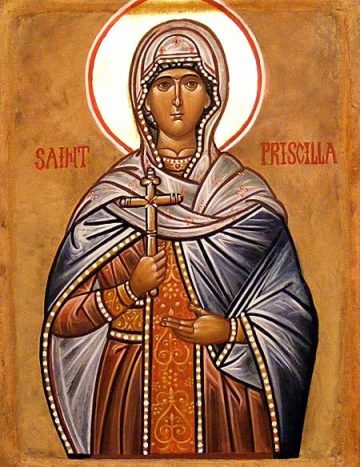
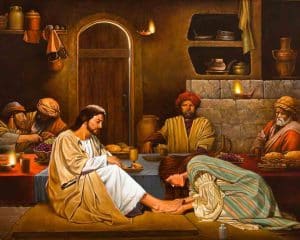
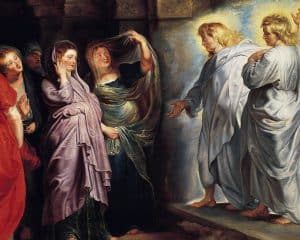

15 Responses
This is a beautiful narrative of the life of Priscilla. Thank you. I had not paid attention of her refugee/immigrant status before. Such a relevant example of partnership, faith and struggle for our time.
Yes
I am bookmarking this. Delightful and enlightening post!
This is excellect, Em! It’s made me think more about how we label all women in relation to the antiquated concept of Eve, being secondary and a seductress. We know that this concept is false- Eve was smart enough to take the fruit, whist Adam dragged his feet, yet even Mormons can still villify Eve, and attribute these misinterperated characteristics to all women. Priscilla blows these incorrect assumptions to the dust! Thank you for this excellent post!
Some Mormons may indeed vilify Eve. However, I do not believe the Church does. In fact the newer presentations of the Endowment positively show the struggle and realisation that Eve has to go through to make the choice she does. The choice has consequences, not only for her but for all her generations of children. But that is something as a Church we except as part of the Plan. Creation, Fall and Atonement. Universally this is essential to the Plan. And individually it is too. We are all Created, we all Fall, and we all need the Atonement.
I dislike the new temple films because of the overt drama, but many people like them. I personally don’t believe that Eve had the veil (yet Adam did) and that she knew what had to be done, and tricked Satan rather than the other way around.
An interesting idea, and one I have not heard before. Not sure that it is correct though since it would throw up a few conundrums.
The conversation between Eve and God would be a lie. Both would know why she did it, and it wouldn’t be because of temptation – as per the scriptures.
The “punishment” of hard labour for childbirth would be for what?
It is a nice idea, but I prefer the one that puts a choice in the hands of Eve and she makes the logical one. Then, with the knowledge and understanding she has she convinces Adam to partake also.
I am not as enamoured with the new films as I maybe came over. I am not someone who learns by emotion. However, I do know lots of people who have been positively effected by them. That they are all different is good too.
Whatever actually happened, in whatever the “Garden of Eden” really was, only effects us in that the Fall was key to the Plan. What the individual roles were, and how they played out, is secondary – so our differing beliefs will not have negative influences on how we live.
Great post. Lovely message. I am not sure that you help your cause with statements like this one though.
“It matters when a male pronoun is treated as if it were all-inclusive.”
That is how our language works. We do not use gender as a word attribute like many other languages.
Human and mankind for instance. And I can see, and have done here, an argument for using male pronouns in some cases.
For instance, let us suppose that the priesthood were to be extended to the sisters, and that they would also be ordained (there is a difference). Would you advocate ordaining sisters as Priests in the Aaronic Priesthood, or Priestesses in the Aaronic Priesthood?
You see, Priest would make sisters the same. Priestess would always make sisters different. And with that difference comes all the same possible prejudices.
And even in society such pronouns are often confusing in their use. I know that for sometime to refer to a female actor as an actress was seen as something non-PC. They are all actors, and should be seen as the same. I believe that has changed somewhat since I hear them refer to themselves as actresses again.
“For instance, let us suppose that…”
Many people, myself included, believe that women have the priesthood yet do not have keys. I suggest you attend the temple with this idea and see what the spirit directs, keeping in mind that the temple is wholly symbolic.
The thrust of my comment wasn’t about women holding, or not holding the priesthood. It was about male and female pronouns. I used this example since one aspect for some Mormon feminists is ordination of women.
Since you bring it up priesthood keys are not held by the vast majority of men, let alone women.
The difference you refer to is “priesthood” as a power, and authority. Authority comes through being ordained to a specific office of the priesthood – ie Priest.
In the temple women are certainly anointed to become, at a later point, priestesses – and men priests. But these roles are clearly different from being a priest of the Aaronic order since ALL men being ordained have previously been given this power and authority.
Later we are prepared to officiate in priesthood ordinances. But this too must pertain to future ordinances, not already part of the everyday life of members since all such ordinances men are already authorised to perform – as appropriate.
But I accept, and have always accepted the principle that women officiate in the priesthood, as authorised to do so, as do men. Anyone acting in a calling, who has been duly set apart to do so, is doing so by a portion of priesthood authority delegated to them. Likewise in the temple.
The only ordinances in the temple performed by virtue of the priesthood directly held by the person performing them are Baptism, Confirmation and Sealing.
Initiatory ordinances, and the various parts of the Endowment ceremony, are done by virtue of the priesthood keys held by the temple president.
Actual priesthood can only be conferred by the laying on of hands. And one can only be ordained to priesthood offices in the same manner. For this reason resurrected beings were required to bring back the priesthood to earth.
This is s great analysis. With the scriptures about Priscilla so scattered, I always thought there wasn’t enough information about her to know her. This was so helpful to me.
Excellent article in every way–making a story out of scattered details–examining gender roles—I think it’s a good point about “sisters and brothers”—my own lingering question involves what “presiding” means in an ideal marriage where somehow gender roles are somehow equal yet different. Next time in church I can say “Eve and Adam” I think I will. . .
[…] PLEASE read the blue “Wife of Aquila” hyperlink above, and this additional Priscilla hyperlink; with my thanks to The Exponent and their writers. I couldn’t have said it any […]
What a wonderful and empowering article. SO thoughtful and well researched, I plan to use this for a character study of Priscilla.
I’m so happy and grateful for Priscilla and Aquila. They stood their ground and taught the word of God regardless of the cost. I’m so glad I legally changed my name to Priscilla. My personality fits hers perfectly.